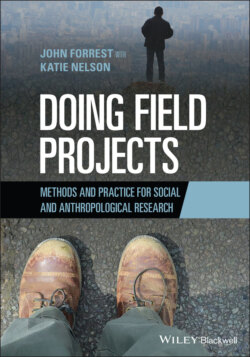Читать книгу Doing Field Projects - John Forrest - Страница 13
Part II Analytic Strategies Fieldwork Vs Ethnography (or Ethnology)
ОглавлениеAnalytically, there is a difference between doing fieldwork and writing ethnography (or “doing” sociocultural anthropology), although the edges between the two are fuzzy. Rather loosely, we can think of fieldwork as the process of data collection, and ethnography as the next step: writing up field notes into finished form that analyzes the field data. But things are not that simple. There is a necessary synergy between data collection and its analysis. Etymologically, “ethnography” is a blend of two Greek roots (ethnos = a people + graphein = to write). The older, more generic, term for the study of cultures was “ethnology” where the suffix logos (= knowledge) was preferred – akin to biology (life knowledge), geology (earth knowledge), theology (god knowledge), and anthropology (humankind knowledge). Today, “ethnology” is considered a somewhat dated term, although it is still used, and the notion that we are writing about a culture seems to sit better philosophically with anthropologists than the thought that we definitively know something about them. After all, writing about cultures always entails analysis even if only implicitly. There is no such thing as a simple description of a culture without some kind of analysis. The bias of the observer is inevitable.
Terminology aside, curiosity about “other” cultures has a long history (see e.g. Malefijt 1974; Honigmann 1976). Not only did ancient and medieval scholars, such as Plutarch and Ibn Khaldun, describe the cultures of other lands, they also developed theories concerning why people in those lands behaved in the ways that they did. These classical theorists had numerous insights, some of which we can still debate today (does climate affect personality and/or behavior, for example), but they lacked rigorous fieldwork methodologies. Well-designed fieldwork is what sets apart the modern study of ethnography from these older sources. But “rigor” in the context of qualitative analysis is a thorny issue. Controlled experiments are not ethically viable in sociocultural anthropology, although certain kinds of quantitative analysis used in anthropology (such as studies of nutrition or life expectancy cross-culturally) are able to borrow rigorous methodologies in emulation of physical science. This point raises the objective versus subjective dilemma within social science.
